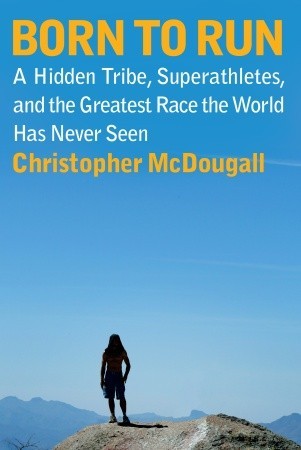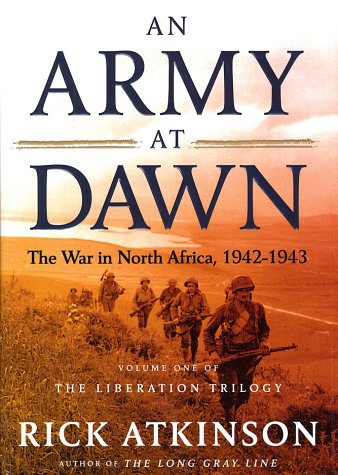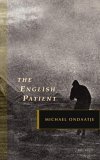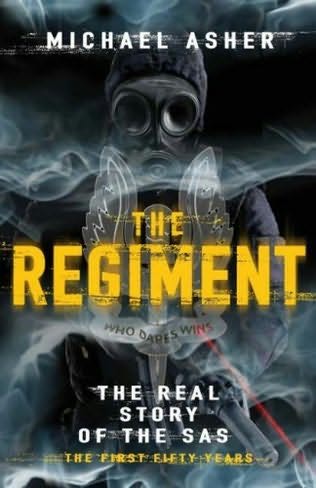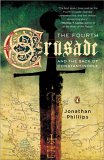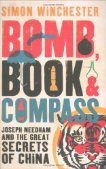Books
Anyone who says they have only one life to live must not know how to read a book ~ Unknown
Born to Run: A Hidden Tribe, Superathletes, and the Greatest Race the World Has Never Seen
by Christopher McDougall
|
|---|
| My Brief Take: Simply the best book on the uniquely human activity of exercise written by anyone today. What started out as an individual's quest to understand the cause of the physical ailments suffered during running turns out to be a passionate discovery of something more. And that is the legacy handed down by our human ancestors so that we are what we are today. With it the insight that certain physical activities are intrinsic to what we are as a species. Never has the story of running been told in such a way as to evoke the passions about life in general through the experiences of real people who just happen to be fitter than most. As much as the events that the author shared inspired, the latter also persuades convincingly how the physical setup of our body determines the activities that we engaged in during survival endeavors. The result is a very engaging mix of sports science, adventure recounts, anthropology, real human drama and sportsmanship with a heavy dose of wit all around. All these in one book. Read it and you might change your mind about what you always think and feel about running. |
| Other's review:I would be comfortable stating that this book is the best work of non-fiction I've ever read. I've recommended it to everyone regardless of if they run or not. In the past four years I've taken up running and even my paltry knowledge and enjoyment of the sport was greatly enlarged by reading this book. By the end of it I desperately wanted to be able to run an ultra-marathon. Unfortunately my body isn't really capable of that, and I think after 4 miles I might just give up. I loved McDougall's narrative style and how he wrote about the larger-than-life people he met along his journey (and more often than not I would forget I was reading non-fiction since it read so much like fiction because of these crazy characters). I really enjoyed the smattering of science, history, food, and culture he wove into the story that all supported this amazing journey. I know a book is good when I desperately want to share all the cool facts and stories with anyone who will listen to me; on that scale, this book is seriously good. I would recommend this book unabashedly to pretty much anyone. There are a few swears close to the beginning, but it's nothing gratuitous. Overall assessment: awesome, awesome book.-Elise |
An Army at Dawn: The War In Africa, 1942 - 1943
by Rick Atkinson
|
|---|
| My Brief Take: One of the best books on World War 2 history i have read to date. Despite being a writing on military history, it never at once felt heavy for the reader. Instead what turns out is a very entertaining and close telling of the experiences of men and their leaders during a very violent period of the 20th century. I particularly enjoyed the numerous anecdotes and retelling of actual things that had happened and was said, and the way the latter had been used to not only deliver a lighter feel to the often tremendously deadly effects of war combat but also how they illustrate the chaotic and at times amusing turn of events so common in a large scale war. Here you could find real life examples of leadership, valor and battle strategies that are significant in turning the tide of a battle and ultimately the larger war itself. A recommended read even for those who find history too stuffy. |
| Other's review: I found Army at Dawn to be an easy-to-read, very enjoyable account of America's involvement in North Africa... as Rick Atkinson clearly points out, this was the real-world testing and proving ground for the US Army's future engagements on the European continent. Much of the book reads like a novel. Powerful images of open desert and mountain warfare from all countries' perspectives. The hundreds of personal quotes from eyewitnesses bring more than just life to the book; it's as if this campaign occurred just a few weeks ago or is going on as you read the book. Of particular interest was the description of France's involvement; so much indecision in the early stages of this campaign! As I finish the last few pages of the book, I'm more interested than ever to read how the stage was set for the North African campaign... Italy and France's involvement in the 1930s in North Africa is still a mystery to me and one that I plan on reading about. Thanks Mr. Atkinson for fueling that interest! Overall, I highly recommend the book, especially to someone who is looking for a broad telling of US involvement, from the thousands of soldiers boarding ships without knowing their destination to final victory in Tunisia... along the way you'll "see" vivid descriptions of individual combat and day-to-day life experiences in North Africa. Highly recommended.by Stephen |
In the Heart of the Sea: The Tragedy of the Whaleship Essex
by Nathaniel Philbrick
|
|---|
| My Brief Take: A gripping tale of the thrills and dangers of whaling in the old days and of the real events that inspired the book Moby Dick. A true harrowing account of what tough men do and think when faced with very desperate and almost hopeless situations. |
| Other's review: The book opens with the finding of two survivors of the Essex. The men, their skin covered in boils and bodies withered from starvation, were found clutching the bones of their former shipmates and sucking the marrow, their last source of sustenance. From there, Philbrick blends the history of whaling, the island Nantucket, and the men of the Essex on their doomed voyage from day one until the end of their terrifying ordeal. Philbrick weaves a narrative so engaging that I found myself emotionally attached to the characters and could not put the book down. As these men waged a daily battle for survival, and their slow physical and mental deterioration is described in such harrowing detail, even I, as a reader in the distant future, felt an overwhelming sense of futility in their efforts. I cannot imagine how these men found the will and the way to survival. This book taught me some amazing things. It taught me that civilized life can be quickly lost as the instinct for survival can turn men to barbarous acts. I learned how terrible the stages of extreme dehydration and starvation can be. It also taught me that men resorting to savagery are still capable of honor. This was one of those true stories that one cannot believe. This was a terrifying, yet touching story, told by a master storyteller. The tale of the Essex is perhaps history's greatest testament to how precious life is and the acts men will do, both horrific and honorable, to survive. by John Maniscalco |
The English Patient
by Michael Ondaatje
|
|---|
| My Brief Take: A companion to the academy award film adaptation, the story and emotions are expressed more poetically here in the novel along with the other half of the story that was untold in the movie. A picture may well worth a thousand words, but sometimes you may miss out quite a few along the way. If you like the film, then read the book! |
| Other's review: When I first experienced this novel, I was a freshman in college. My grades had been poor because the journalism major I had thought I wanted to pursue turned out to just be a series of courses on how to write with hot air and the unnecessary rules that bind that style of writing--it was clear that Hunter S. Thompson had made no impression on the School of Journalism at the University of Maine. I was clearly too depressed and listless to make any real attempt at passing those journalism courses, and the few English classes I was taking were "core" classes and so crammed lots of Shakespeare down my throat (despite my current infatuation with the Bard, I was then much too restless to appreciate the finer qualities of his plays). And then, Professor Norris assigned us The English Patient. I remember thinking within the first few pages of reading how bizarre the novel seemed to be. After all, the tense shifts frequently back and forth from present to past in an apparently random fashion. The setting jumped all over the place, from an abandoned Italian monastery towards the end of World War II to a cartographers' camp outside of Cairo, and so on. And yet, it was clear to me by the time I finished that, despite the apparent randomness of the technical aspects of the novel, no other novel had ever left such a definite and lucid impression on me. I truly knew the characters, how they thought, how they acted, and how they interacted with one another. The plot, while it seemed difficult to follow at first, was not only understandable by the end but moreover heartrending and tragic. I had no idea that novels could do this, be so disjointed and yet singularly impressive and evocative. Needless to say, my faith in literature was completely renewed after reading The English Patient, and while it is perhaps not the best example of the novel (remember, this was years before I first encountered Ulysses), it nevertheless showed me the infinite possibilities of the narrative form. Indulge me for a moment to divulge a bit more about the novel itself: The characters in the novel are among those from literature I will remember and cherish as long as my memory remains intact. There is Hana, the young Canadian nurse who is clearly suffering from PTSD (for many things experienced during the War, including the death of her father, a pilot who was shot down) and is trying to make it right by caring for someone who will remain alive. There is Almasy--the titular patient--who we first encounter as a mystery burn victim, a man pulled from the wreckage of a crashed plane (as Hana's father would have been had he survived...), but who we later learn is a much, much more complex character. There is Caravaggio, the Canadian thief (and apparent friend of Hana's father) and sometime secret agent who is now mysteriously missing both of his thumbs. And there is Kip, the Sikh sapper who has joined the British Army in an attempt to show his loyalty to the British Empire and assimilate himself into it, despite protests from his anti-Imperial brother. And these are only the characters we meet in the "present" time of the novel, that is, the end of World War II. I have said nothing of Katharine, around whom Almasy's stories and memories constantly revolve, or Geoffrey Clifton, Katharine's husband, who becomes an obvious obstacle for Almasy (though the author, Michael Ondaatje, never allows his narrative to sink to the level of a soap opera). These characters live only in the memory of the novel, and we never see them in the "present." The reason we never see them in the present is one of the reasons why the novel's plot is so heartrending. I will say nothing of what happens, except to say that if you have seen the equally wonderful--but incredibly different--Academy Award-winning film adaptation, you only know half of the story. There is so much more going on in the novel, things that cannot be fully translated to the screen because they are emoted in such a dreamlike and poetic fashion. Michael Ondaatje is one of the contemporary authors I admire most. He follows the "rules" of novel-writing, but only until they hamper his ideas, at which point he bends them or ignores them altogether. He seamlessly blends poetry and prose and is therefore able to touch emotions that most other novelists completely ignore. Undoubtedly, it is for these reasons that I found The English Patient so refreshing back in the spring of 2001, and why I have since returned to it time and time again. by Michael Kneeland |
What The Dog Saw
by Malcolm Gladwell
|
|---|
| My Brief Take: Interesting subjects made more interesting by his insightful explanations and non-conventional ways towards thinking about them. Not so interesting and everyday things made interesting by his unique perspectives and compelling story telling. Read this book if you want a critical and alternative view of the things happening around you. |
| Other's review: Every time I read Malcolm Gladwell's work, it makes me think about my life and what is going on around me with a slightly bigger lens. Often, there is something in his work that makes me want to sit up a little straighter and work a little harder. This book was a collection of his articles written for the New Yorker magazine. All of these pieces were interesting and fun to read. You don't necessarily need to agree with everything in them to enjoy them. The value of the articles here is not in the information that they give you, though that is interesting on its own, it is the questions that they raise. In every article there are questions about the topic and about what that topic means for the larger world. There are even questions about how we ask and answer questions, which is probably the most valuable thing of all in this book. This all sounds pretty high minded for a book that has articles about infomercials, hair color, aerial photography, and pit bulls. But somehow, that is where Gladwell manages to take us as he writes about everything from Heinz Ketchup (which scientifically is the best ketchup) to Homelessness. I would recommend this book to anyone who is interested in the way the world works acorss a variety of disciplines. by Benjaminxjackson
|
The Regiment: The Real Story of SAS
by Michael Asher
|
|---|
| My Brief Take: The real life accounts of what this special group of people do to achieved their objectives despite the very dangerous nature of their missions. Sometimes certain work takes a certain breed of people, and here they are most distinguised by their feats of daring. There are instances of real heroism and of outrageous things done by real people during war time and you can read all about them here. Bravado and derring-do at its best! |
| Other's review: This is the best book I have read about the SAS. There are other histories, but none so complete as this. The author's skill is to make the action seem real - so vivid that you almost feel you are there. At the same time the book demolishes some myths about the SAS, but without reducing the reputation of the Regiment at all. What you are left with is real people not superhumans, and that's what makes the book so good. by Roy Blanchard |
Stalingrad
by Antony Beevor
|
|---|
| My Brief Take: An account of one of the critical battles of world war two. It is historically accurate and yet never feels like reading a history text. It is gritty and has a no holds barred attitude in retelling the immense difficulties and sufferings of man caught in fighting a war and of the effects the latter have on others. Great book to know how it feels like to be a soldier (russian or german) fighting during the last great world war. |
| Other's review: This book is an astounding piece of work. Beevor does not have the moral resonance of a Martin Gilbert or the sparkling language of a Dan Van Der Vat, but in his own stolid way he tells a damn good story. Painstakingly researched and grippingly told, the book begins with Operation Barbarossa, Hitler's ill-conceived and treacherous plan to invade the Soviet Union. As we all know, this attempt foundered after the Soviet counter-attacks around Stalingrad in the Northern winter of 1942-43. Beevor attains a nice balance between telling the stories of the top leaders with their cigars, brandy and strategy maps, and what life was like for the ordinary soldiers who died in their hundreds of thousands in the snow. He also has a nice balanced approach to the two sides; we are spared neither Hitler's stupidity and vacillation, nor Stalin's arrogance and carelessness. Ultimately, the book's thesis is that both leaders were pretty careless of their own people's lives, but that Stalin was the more pragmatic; Hitler's amour propre and fey mysticism cost him and his country dear in the end. A fitting lesson for our times. by John |
Empire: How Britain Made the Modern World
by Niall Ferguson
|
|---|
| My Brief Take: A very readable account of the history of the biggest empire ever. How did a country consisting of just a group of islands in Europe came to control, at its peak, the whole of the world's oceans and a quarter of its population? And was the empire ultimately good or bad given the judgment of history? Intellectually satisfying to the student of history and of those who wants to know the full extent of the british empire's reach and influence in the different parts of the world. |
| Other's review: Niall Ferguson, author of other non-fiction hits as "Pity of War", "The Cash Nexus" and 2006's "War of the World" offers a modern analysis of one of the most influential empires in history. An Englishman, Ferguson tackles the history of the British Empire in this layman's volume of 370 pages, rich with illustrations, maps, and photos stretching from empire's reluctant beginnings in the 17th century to the final collapse following WWII. Niall has two great qualities for a history writer that endears him to this layperson - the ability to write history in a witty, conversational fashion, and a penchant for promoting alternative conclusions for historical events. For example, he rates the British leadership over India as an overall positive thing, without which India would not have quickly risen to the heights it has obtained today, in fact, it may have easily fallen victim to the Japanese empire of WWII. Before reading this book, I had scant knowledge of the history of the British Empire, besides the stories of American colonial resistance to British rule, and the dysfunctional relationship of ruler and ruled in Burma detailed by George Orwell in his essay "Shooting an Elephant". I came away from this book with a much more thorough understanding. At its height, it governed about 25% of the world's population and covered about 25% of the world's habitable land. All this was accomplished with a relatively small number of administrators and soldiers. Indeed, the colonial areas supplied large percentages of the Empire's soldiers for small regional conflicts and large wars with other European powers. Niall argues that this was accomplished by the relatively benign rule of the English and an increasingly loosened authoritarian grip, ending in a Commonwealth of states that survives in small form today. Whereas other modern empires, such as Stalin's Soviet Union, Hitler's Reich and Tojo's Japan were ruled by a heavy hand and often brutal tactics, the British were more "hands off", their empire having more of a commercial orientation with occasional digressions into missionary movements and cultural assimilation. Perhaps the most poignant point of the book was Ferguson's reasoning for the end of the British Empire - after being sapped of money and resources from the first world war, Britain was faced with a stark choice when Hitler began his campaign across Europe - agree to a peace deal with Hitler or lose the empire in a draining fight to the finish. Ferguson argues that Churchill led England on the more noble path of imperial self-sacrifice for the good of the rest of the world. Britan also failed to benefit substantially from the Marshall Plan and IMF/World Bank loans following the war to the extent that those same Axis powers were able to use to their benefit. Another surprise for me was Niall's argument that Britain continued to lose imperial possessions after the war due to the sometimes predatory policies of the US. While the 20th century relationship between the US and Great Britain is often portrayed as one of friendship, Ferguson paints a picture of a US more interested in containing communist expansion at the expense of the British Empire during the Cold War. Through a series of humbling military blunders and numerous independence movements among the colonies, British colonial administrators often found themselves presiding over poignant transfer-of-power ceremonies, the empire steadily disintegrating after the 1940s to today's Commonwealth of a few scattered islands around the world. Traditionally, empires are seen as evil accumulations of power, enslaving masses of subjects for the benefit of a ruthless ruling people. Niall argues that in the end the British empire was a positive presence in the world. Ferguson says that without it, the spread of democracy, capitalism, even the predominance of the English language as the world's business lingua franca would not have happened, or to a much smaller degree. by Robert DePriest |
The Fourth Crusade and the Sack of Constantinople
by Jonathan Philips
|
|---|
| My Brief Take: A tale about how a series of events can caused a group of people to commit a henious act that would otherwise have been sacrilegous beyond their wildest beliefs. It is not the plans of men but the intervening events that shape the course of history and its outcomes. The history of the tragedy at Constantinople is the best illustration of this theme. Read this if you want to know the motivations of the people in power and the people under them behind the famous christian army of the middle age. |
| Other's review: An honest and concious account of the Fourth Crusade written by a superb historian. Jonathan Phillips explains how an initially Egypt bound expedition goes wrong from the start and ends up taking one of the most splendid cities of Christianity. The seemingly incredible event is broken down and analysed, leaving the reader with the understanding that the Fourth Crusade was an avalanche of unfortunate accidents one after the other, leading to an outcome no one ever could have foreseen. A crusader army leased a fleet from Venice but fails to bring enough participants to pay off the debt. The crusaders gave what they had, but both they and the Venetians, who halted their normal mercantile business for a year, were on the verge of bankrupcy. To ease the disastrous financial burden, the crusader army tries to muscle Zara, an economic opponent of Venice, into surrender. When Zara is on the brink of surrendering, unrest in the crusader army prevents a bloodless outcome. The pope forbade the attack, and some crusaders tell the inhabitants of Zara that the Franks won't support the Venetians, and so they will only face their small part of the army. In this belief, Zara prepares to hold out. But the crusaders did support the Venetians, feeling honor bound to their outstanding debt. Zara could not withstand the combined force of the crusaders and Venetians. All the loot and money raised from the siege went directly to settling the debt. The crusaders earned no penny, but at least their crusade was back on track, only to be thrown off trail yet again. A young Greek prince offers the crusaders a deal that sounds too good to be true: If they return him and his father to power, he will pay them handsomely projecting the end of the debt, reunite the church of Byzantium with Rome, and support the current crusade by sending Greek soldiers and leasing the Venetian fleet for one more year on his costs. Again the crusaders and Venetians think it will only come down to a mere show of force, presenting the rightfull ruler to his people and rounding up the false regent. But it proved to be more difficult. They eventually succeed in bringing the prince and his father Isaac Angelos back on the throne. But the Byzantine rulers have trouble filling in their promises. To raise money, they mulc their subjects, creating an atmosphere of hatred towards the crusaders. The crusaders demand their rightfull pay and the Byzantines can't gather that sum. It is the same situation as arose in Venice. The crusaders were still broke and the expenses kept mounting with every diversion. When the people of Constantinople turn to full scale rebellion and overthrow the new rulers, the crusaders besiege the city. A small broke and frustrated crusader army attacks Constantinople, and almost by miracle captures it. What follows is a grim and gruesome scene of pillaging, looting, raping and sacking. But with the previous troubles in mind, it is no longer an incredible outcome. The crusaders choose a new emperor from their midst and create the Latin kingdom of Constantinople. The pope who once forbade the crusaders to attack Zara now saw his dream of a united church came true. But the capture of Constantinople diverged crusader energy, and in the end weakened the christian cause. Even when the Greeks recaptured their fair city, they would never recover from the blow dealt that day. by Toonvanelst |
Bomb, Book & Compass: Joseph Needham & the Great Secrets of China
by Simon Winchester
|
|---|
| My Brief Take: My initial motivation for the book is really to find out more about the rich scientific culture of the past chinese people. Being a chinese myself, i am of course proud that i am among the descendents of such a innovative and ingenious people. This book though is about the research journey of a scholar, who undertook it to create one of the biggest collections of facts about chinese scientific history. As it happens, the process of research in the past before internet of course involve quited a fair bit of physical travel and it is during these occasions that gave rise to the unique expereiences and adventurers of Joseph Needham. It is interesting to read about the perspectives of a westerner working his talents on a part of our chinese heritage and with such good interest to add. |
| Other's review: This is a biography about a unique Cambridge scholar who recorded all the great inventions by the Chinese - including bombs, books, and compasses. This was revolutionary in a sense that he changed the world's view of China as a backward nation - in fact, it was far more advanced than others in terms of volumes and frequencies of innovation! However, the more intriguing part of this book is how Joseph Needham himself is an eclectic character who becomes intertwined with the politics of the time. Joseph, his wife, and his concubine all had a cordial relationship together based on science; and he becomes good friends with Zhou Enlai (Mao Zedong's #2). It is a tale of academic curiosity and an extraordinary man. by saki |

